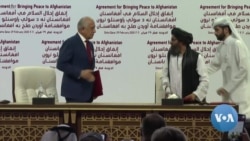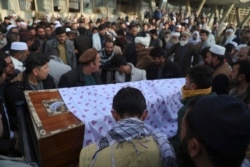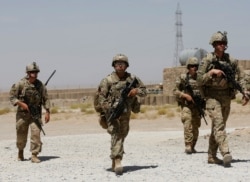A year into the U.S.-Taliban agreement, Afghan leaders say they are frustrated with the continued rise of violence by the militant group that has taken a toll on civilians.
The agreement, signed on Feb. 29, 2020, asks for the withdrawal of all U.S. forces by May 2021, but only if the Taliban keep their promises of cutting ties with terrorist groups and participating in intra-Afghan talks for a permanent cease-fire and a political roadmap for Afghanistan.
“The increase in violence has disappointed Afghans,” said Shukria Barakzai, a former member of the lower house of Afghan parliament. “The Taliban promised that they will reduce violence; and would make peace with the Afghan government, but unfortunately they have not done so.”
More than 3,000 civilians were killed, and 5,800 others were injured in Afghanistan in 2020, according to a report published Tuesday by the United Nations Assistance Mission in Afghanistan. UNAMA said civilian casualties rose 45% after the start of the intra-Afghan negotiations on Sept. 12 in Doha, Qatar.
Referring to the stalled talks in Doha, Barakzai said the Afghan government representatives, despite months of effort, were unable to make progress toward peace because “the Taliban are not willing to talk to them.”
The intra-Afghan talks started six months later than scheduled because of a rift between the Afghan government and the Taliban over the release of 5,000 Taliban prisoners.
According to Michael Kugelman, deputy director of the Asia Program at the Wilson Center in Washington, the U.S.-Taliban deal did not specify the reduction of violence as a requirement.
While Kabul remained unhappy about the deal, the Taliban intensified attacks on military and civilian targets as a bargaining tactic, Kugelman said.
“If you want a real agreement leading to peace, at the very least you need to stipulate is that the insurgent actor must cease violence or at least reduce violence,” he added.
Sidelining Kabul
Some Afghan officials say leaving Kabul out of the February 2020 deal has only emboldened the group to increase hostilities. The Taliban at that time argued they would not talk with the Afghan government because they did not recognize it as legitimate.
Following the agreement, the Afghan government signed a memorandum of understanding (MOU) with the U.S. in which it said it “welcomes the reduction in violence period and takes note of the U.S.-Taliban agreement.” The U.S., for its part, pledged to work with the Afghan government to achieve “a sustainable negotiated agreement.”
“Afghan government is one of the parties in the conflict, and it should have been part of the deal,” Rahmatullah Andar, a spokesperson for Afghanistan’s National Security Council, told VOA.
Andar argued that Kabul’s importance was overlooked in the success of the U.S.-Taliban deal, “therefore, this agreement was not effective in [bringing] peace, stopping the bloodshed, and ending the war and sufferings of Afghans.”
Bradley Bowman is a senior director of the Center on Military and Political Power (CMPP) at the Foundation for Defense of Democracies (FDD). He called Kabul’s exclusion “a big mistake.”
“The reason is that there is no safe American exit from Afghanistan that does not include an Afghan government that can maintain security in its country,” he said.
The new U.S. administration has said that it is committed to working closely with the Afghan government in the future. The officials in Washington have said they are reviewing the deal, including an assessment of whether the Taliban met their commitments.
Al-Qaida ties
Edmund Fitton-Brown, coordinator of the United Nations monitoring team for Islamic State, al-Qaida and the Taliban, said Thursday in an online event at the Middle East Institute that the Taliban have failed to cut ties with al-Qaida.
“As yet, we have not seen any evidence,” he said.
Al-Qaida has 400 to 600 fighters operating in a dozen of provinces in Afghanistan, according to a U.N. report released in July 2020.
A U.S. Treasury Department report on Jan. 4 said that al-Qaida was reorganizing in Afghanistan.
“Al-Qaida is gaining strength in Afghanistan while continuing to operate with the Taliban under the Taliban’s protection,” the report said.
The Afghan government in the past has said that its security forces have killed a number of al-Qaida leaders and operatives in Afghanistan. The government said the killings show that the Taliban are not keeping their promise of cutting ties with the group.
The Taliban group has rejected the presence of any foreigners in its ranks. However, in an unprecedented move Tuesday, it issued a statement directing its fighters to avoid harboring foreigners.
Taliban’s spokesperson, Mohammad Naeem, in a Skype interview with the VOA Afghanistan Service, claimed that the group has abided by the agreement.
“The U.S.-Taliban agreement has a clause that says that the Afghan soil would not be used against the security of any country. We made a commitment and nothing like that has happened since,” he said.
Naeem warned that should the U.S. refuse to withdraw its troops by May 1, “it is clear that it will create a problem.”
Withdrawal deadline
The U.S. has reduced its troop levels from 13,000 in February 2020 to 2,500. Some observers say a full withdrawal in May is unlikely given the concerns that the Taliban have of not fulfilled their commitments.
“A six-months extension will give us a means to deal with the other issues – namely to find a political solution, a cease-fire and so on,” said Barnett Rubin, a former State Department official.
Rubin said the U.S. will need to negotiate a possible extension with the Taliban. Alternatively, “there [will] certainly be a very serious escalation of violence.”
Richard Olson, former U.S. special representative for Afghanistan and Pakistan, said that an extension of U.S. military presence will not only increase the leverage of the Afghan government in the negotiations with the Taliban but also help stabilize Afghanistan.
“It will maintain some degree of pressure on the Taliban to meet their core commitment under the Doha agreement,” he said.
Civil war
A bipartisan report to Congress, released Feb. 3, said that the withdrawal of U.S. forces should be contingent on the reduction of violence, progress in intra-Afghan negotiations, and the containment of al-Qaida.
The report warned that an irresponsible withdrawal of the U.S. troops will lead to a civil war.
Steve Coll, author of “Ghost Wars: The Secret History of the CIA, Afghanistan, and Bin Laden,” told VOA’s Afghan Service that the recent surge in violence, combined with the slow progress made in the intra-Afghan talks, risks the outbreak of a new cycle of war in Afghanistan.
Coll said “the nightmare scenario” will lead the country back to a civil war with many sides and few constraints. Such outcome will be devastating for Afghans, particularly the young generation that grew up in urban centers in the last 20 years, he warned.
VOA Afghanistan Service contributed to this report.








